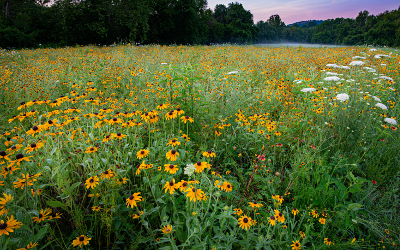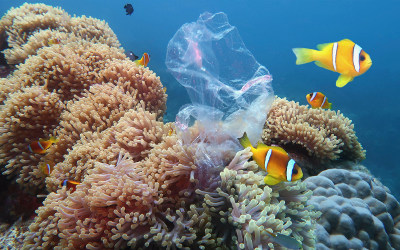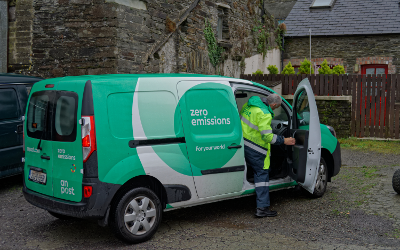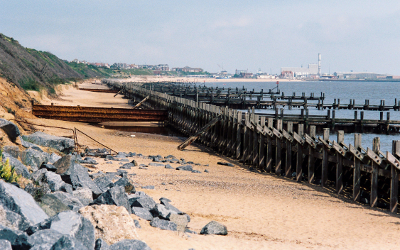Spotlight on OU climate emergency research
As world leaders gather in Glasgow for the United Nation’s 26th Climate Change Conference of the Parties (COP26) from 31 October - 12 November 2021, we look at five ways Open University (OU) research is responding to the climate emergency.

Preserving and recovering England and Wales’ vital floodplain meadows
Floodplain meadows alongside England and Wales’ rivers play a vital role in absorbing floodwater. Thanks to the sediments floods deposit, these biodiverse meadows can also contain more than 40 different plant species per square metre, which are an essential source of nectar for pollinating insects, such as bees, and are crucial to carbon storage. For farmers, they are an essential resource, providing both hay and grazing for animals.
However, agricultural intensification, urban and industrial development during the past hundred years has led to the disappearance of more than 97% of these habitats.
Since 2007, OU environmental scientists, led by Professor David Gowing and funded by the Esmeé Fairbairn Foundation, have spearheaded an innovative collaboration with partners such as Natural England, Natural Resources Wales and the Environment Agency to research, manage, promote and restore these unique meadows in England and Wales.
Among other projects, the Floodplain Meadows Partnership recently won a substantial grant from Ecover to restore and protect 50 hectares of floodplain meadows along the banks of the River Thames in Oxfordshire.
The research has also changed how the Environment Agency approaches floodplain wetlands, influenced the UK Government’s National Flood Management policy and encouraged planners and conservation practitioners to use floodplains in flood management schemes in cities such as York.

Turning the tide on attitudes to ocean health
OU ocean scientists Professor Mark Brandon MBE, Dr Philip Sexton, Dr Miranda Dyson, Dr Pallavi Anand and Dr Carl Boardman, steered the production and scientific content of the ground-breaking BBC TV documentary series Blue Planet II. The landmark series shared their pioneering work on diverse topics from marine circulation and ventilation coral bleaching, helping viewers understand our oceans and the threats they face.
The programme catapulted ocean health into the public consciousness and changed behaviour. It inspired the European Commission to ban single-use plastics in 2018. It also led the UK Government to ban microbeads in 2018, increase charges for single-use plastic bags from five to 10 pence the same year, and ultimately ban single-use plastics, such as straws, in 2020.

Making Milton Keynes a sustainable transport pioneer
During the past decade, OU transport, technology, and innovation researchers Emeritus Professor Stephen Potter, Professor Matthew Cook and Dr Miguel Valdez have collaborated with public and private sector partners in Milton Keynes to make the city a sustainable transport leader. Their substantial expertise in engaging people in technology and urban design played a pivotal role in practical application trials to design sustainable urban transport and energy infrastructures through projects such as MK: Smart.
The researchers’ work has contributed to making Milton Keynes a leader in electric vehicle (EV) adoption, with twice the national average of new EV monthly registrations and one of the most substantial and established charging infrastructures of any city in the UK.
It also underpinned the development of a new system to manage the increased demand for electricity supplies by incentivising high-energy users, such as large businesses, to use electricity flexibly.

Helping SMEs grow greener
The UK’s almost six million SMEs account for 40% of non-domestic energy production and have a significant combined carbon footprint. Yet - even with government financial incentives - they often do not have the resources to focus on becoming greener over business survival.
Professor Richard Blundel and colleagues from The Open University Business School have collaborated with The University of Oxford and business support organisations to create new tools and techniques to help SMEs grow greener.
Their interactive online course, Promoting sustainability in business: a values-based toolkit, teaches intermediaries, such as professional associations, business advisors and economic development organisations, how to encourage SMEs to engage with sustainability more deeply to deliver cost-effective and positive lasting change for their business and the environment.
To date, more than 1,000 people have used the toolkit in the UK and Pakistan and feedback suggests it has helped individuals and organisations to engage SME clients on environmental issues, such as climate change mitigation.

Listening to local climate change
OU geographers Professor Joe Smith and Dr George Revill collaborated with artists, musicians and film-makers to creatively engage at-risk communities in coastal planning.
The Sounding Coastal Change arts project gave a voice to the diverse interests - from local people to wildlife - involved in the often-polarised debate around coastal defence and adaptation on the Norfolk coast - an important indicator of coastal vulnerability to sea level rises. The project highlighted the value of establishing respect, transparency, understanding and mutual trust in engaging local communities in complex issues, such as flood defences.
The UK government and local authorities have adopted Sounding Coastal Changes’ recommendations to improve how they engage the public and other affected stakeholders in climate change mitigation, adaptation and decision making.
Contact our news team
For all out of hours enquiries, please telephone +44 (0)7901 515891
Contact detailsNews & articles

OU study: Transplant athletes match elite performance
A new study led by The Open University’s Professor Bart Rienties, and to be published in Progress in Transplantation in December, reveals that high-intensity transplant athletes can not only meet but greatly exceed existing physical activity guidelines.
